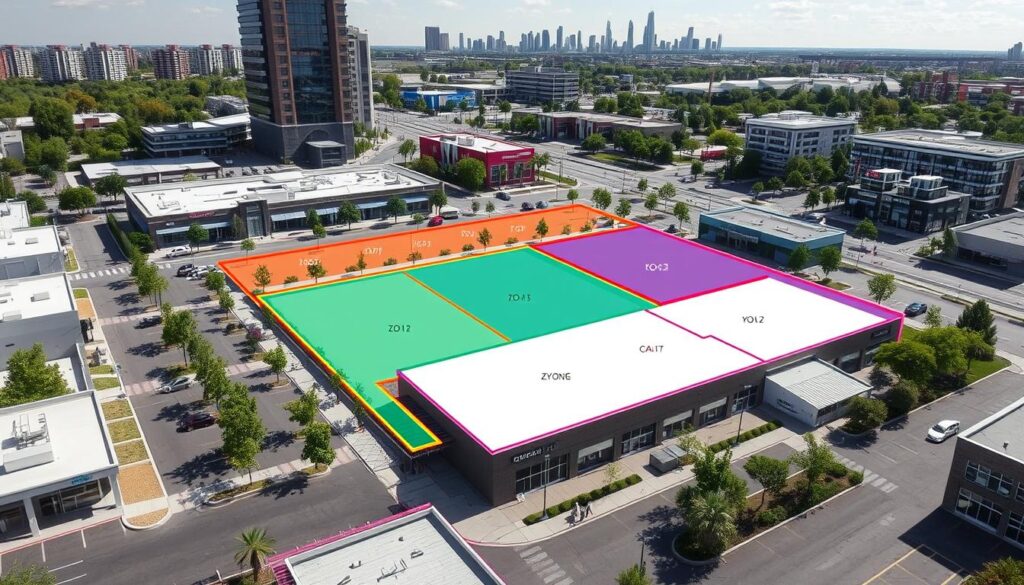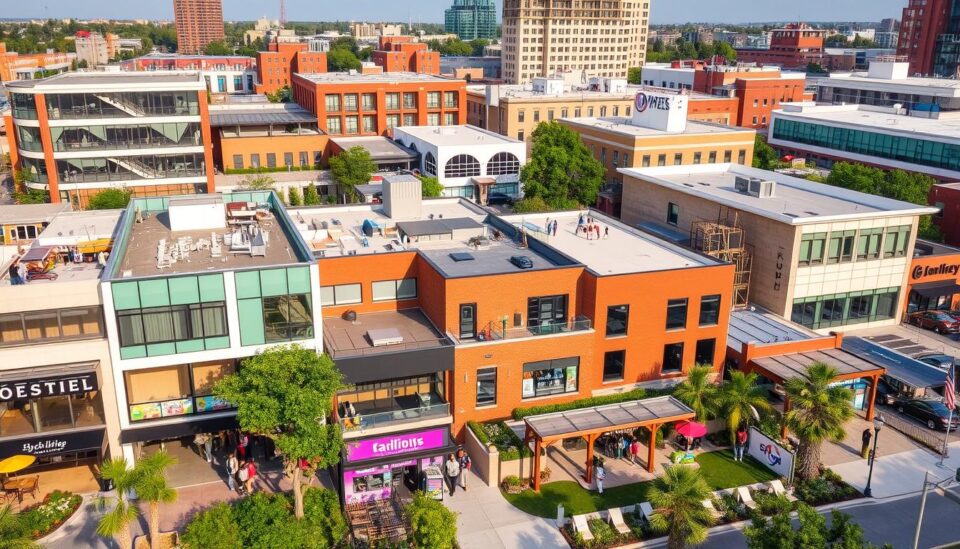Picking the right spot is key to business success. The perfect location can boost growth and output for your company.
Renting gives businesses of all sizes room to grow. You can find many options in the market.
From shops to offices, there’s a space for every need. The right lot can take your business to new heights.
Renting lets you look pro without buying property. It’s a smart move for many business owners.
Finding the best space takes some homework. You need to know what your business needs.
This guide will help you rent the perfect spot. We’ll show you how to match a space to your goals.
Understanding the Different Types of Commercial Lots
Businesses can choose from three main types of commercial lots. These are retail lots, office spaces, and industrial properties.
Retail lots are for businesses that serve customers directly. They have good visibility and easy access from the street.
Shopping centers and strip malls are examples of retail lots. These spaces are great for restaurants, boutiques, and service-based businesses.
Office spaces provide work areas for companies. They range from small rooms to large corporate campuses.
Modern offices often have open floor plans and meeting rooms. Tech startups and consulting firms often use these spaces.
Industrial properties are for manufacturing and warehousing. They have large spaces, high ceilings, and loading docks.
These properties support businesses with big operational needs. Manufacturing plants and storage facilities use these specialized lots.
Knowing the differences helps businesses pick the right commercial lot. This choice can greatly affect their success.
Factors to Consider When Renting a Commercial Lot
Picking the right business space needs careful thinking. Location is key for any successful business property choice.
Businesses must find a spot that’s easy to see and reach. This helps both customers and workers.
Size and layout are very important. Business owners need to picture how they’ll use the space.
A too-small area can slow work. A too-big space might cost too much.
Parking is a big deal for many businesses. Good parking makes customers and workers happy.
Look at parking spots, how easy they are to use, and how close they are.
Check out local roads, buses, and nearby businesses. A good spot can give you an edge over others.
It can help you hire great people and grow later. Always visit the lot in person.
Your budget and long-term plans should guide your choice. Think about lease terms and room to grow.
A well-picked commercial lot can help your business succeed. It can become a key part of your company.
Benefits of Renting a Commercial Lot
Renting a commercial lot offers smart advantages for growing businesses. It’s a cost-effective solution for entrepreneurs seeking flexible workspace options.
Business expansion becomes easier when you rent a commercial lot. You can adapt your space as your business changes.
Companies can grow or shrink without long-term property ownership commitments. Renting gives you the freedom to adjust quickly.
Brand visibility improves with strategic commercial lot selection. Prime locations increase potential customer exposure.
This visibility can boost brand recognition and revenue growth. You’ll reach more people in high-traffic areas.
Financial flexibility is a key benefit of renting. It eliminates big upfront costs of buying property.
Businesses can use resources for core operations and marketing. This approach frees up money for innovation.
Property owners usually handle maintenance and infrastructure concerns. This reduces operational burdens for tenants.
Business owners can focus on their main goals. They don’t worry about repairs or extensive property upkeep.
Renting lets you test different markets without long-term commitments. It’s a smart strategy for businesses seeking growth.
The Lease Process Explained
Commercial lease agreements can be tricky for business owners. Understanding key parts helps protect your business and avoid problems.
Rent negotiation is crucial when getting a commercial space. Research local rates and make a budget before signing anything.
Good negotiators often get better deals. They show market knowledge and financial readiness.
Look closely at specific details in the lease agreement. Important parts include lease length, renewal options, and rent increase rules.
Consider talking to a real estate lawyer. They can help you understand all your contract duties.
Property taxes can add a lot to your costs. Some leases pass these costs to tenants.
Clear up tax responsibilities during talks. Add these costs to your budget to avoid surprises later.
Good lease talks need planning, patience, and smart thinking. Research well and communicate clearly to get spaces that help your business grow.
Finding the Right Location for Your Business
Choosing a commercial lot requires analyzing customer demographics and strategic positioning. Business owners need to research beyond surface-level considerations.
Understanding your target market’s traits will guide your location selection process. Thorough competitor analysis helps identify gaps in the local market.
Mapping existing businesses can reveal areas with less competition. This approach helps position your business to capture maximum market share.
Business accessibility is crucial in location selection. Consider parking, public transportation, and visibility from main streets.
A easily reachable location can boost your business’s success. It can also increase foot traffic to your store.
Urban centers offer opportunities for businesses with high customer traffic. Suburban areas might have lower rent while still being accessible.
Each neighborhood has unique advantages. Evaluate multiple factors before making your final decision.
Use data-driven research about local consumer behaviors and income levels. This will help refine your location strategy.
Geographic information systems can provide insights into business performance. Demographic reports are also valuable for this purpose.
Tips for Searching Commercial Lots for Rent
Find the right commercial lot for your business. Start by looking at real estate listings on websites like LoopNet and CoStar.
Talk to experienced commercial brokers. They know local markets well and can help you find good spots.
Go to business events to learn about rental options. Attend chamber of commerce meetings, conferences, and mixers to get useful info.
Use social media and apps to search for properties. Many brokers now use these platforms to show available spaces.
Make a list of what your business needs. Think about location, size, parking, and how close it is to customers.
Preparing Your Business for a New Location
Moving to a new space needs smart planning. Create a design that boosts work and shows your brand.
Make a layout that fits your work needs. Do this before you sign a lease.
Getting business permits is key. Talk to local offices about rules for your work.
Professional construction consultants suggest gathering all. This helps avoid delays in your move.
Set up utilities early. Plan for power, water, internet, and phone services.
Check local providers for the best deals. Make sure you have fast internet and enough power.
Save money for possible changes to the space. Some businesses need special setups for their work.
A good space design can help your team work better. It can also improve your business overall.
Understanding Zoning Laws and Regulations

Local rules guide how businesses use properties. These laws set rules for different business activities in specific areas.
Each city has its own zoning rules for business lots. Business owners must check these rules before buying or renting property.
Zoning laws can limit building size, parking, and work hours. They may also restrict the types of businesses allowed.
Knowing zoning rules helps avoid legal problems. Check what businesses are allowed and what permits you need.
Ask local planning offices for details on land use laws. They can provide important information for your business.
Zoning maps show different areas for businesses, homes, and factories. Each area has its own set of rules to follow.
Smart business owners study these rules carefully. This helps ensure they follow local guidelines.
Lawyers who know about real estate can help explain zoning rules. They can guide businesses through tricky property laws.
Making the Most of Your Rental Space
Space optimization is key to maximizing your commercial lot’s potential. Smart workspace arrangement can improve workflow and create a welcoming environment.
Flexible furniture and modular design elements can adapt to changing business needs. These investments can help your business grow and evolve over time.
Business signage is crucial for attracting customers and establishing brand presence. Choose high-quality, eye-catching signs that reflect your company’s identity.
Make sure your signs are visible from the street. Good signage helps potential clients spot your business easily.
Community outreach can make your rental space a valuable local asset. Engage with nearby businesses and join local events to build strong ties.
Host open houses or workshops to show your community commitment. These efforts can boost your reputation and create networking chances.
Your commercial lot is a platform for business success. Focus on smart space use, good signage, and community involvement.
These steps can create a dynamic environment that supports your goals. They’ll help you stand out in the marketplace and grow your business.

